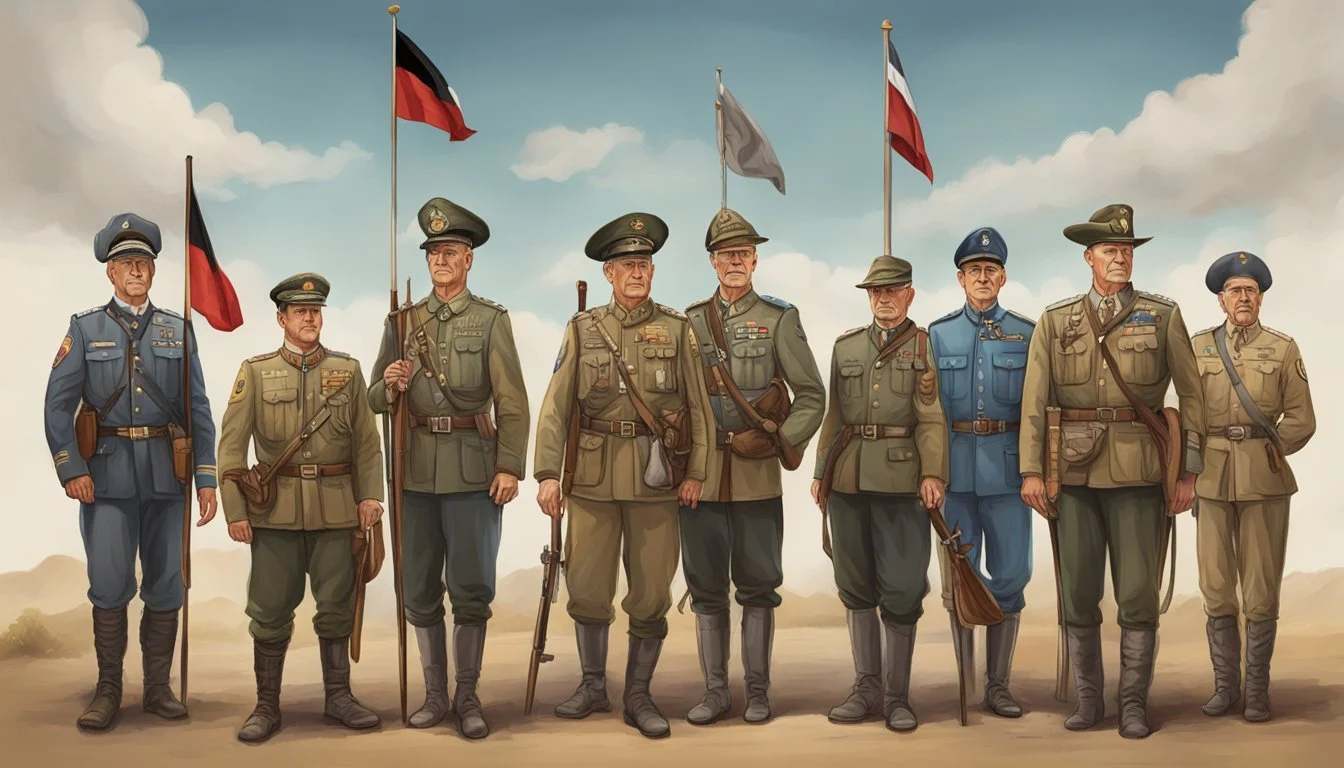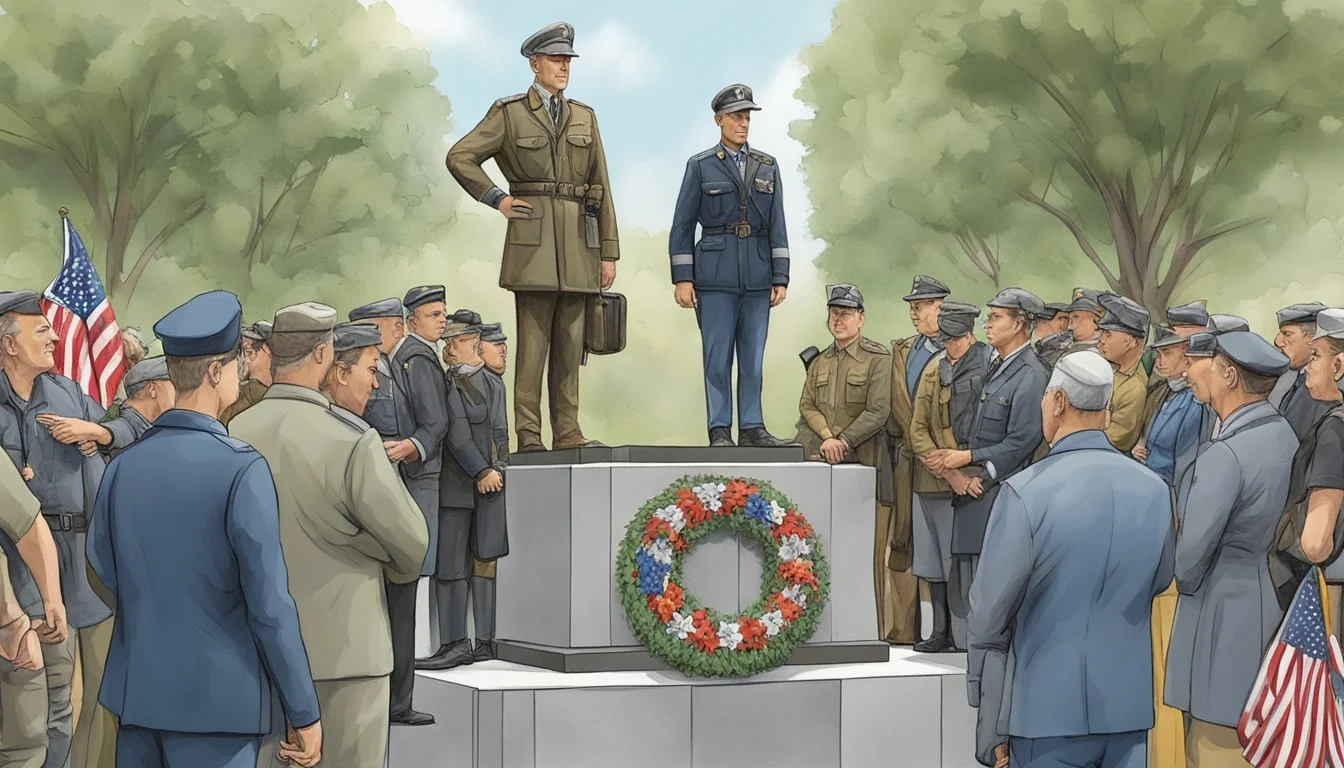The Legacy of German Texan Military Heroes
Valor and Contribution
The lasting impact of German Texan military heroes is a testament to the rich tapestry of the state's history. This legacy is embodied by individuals like John O. Meusebach, who not only founded Fredericksburg but also forged a pivotal treaty with the Comanche nation. His visionary leadership and commitment to peace laid the foundations for a thriving German community in Texas. His and other similar contributions to the military and civic life of early Texas set a lasting example of cultural fusion and bravery.
Military prowess and civic duty were not exclusive to any one figure; rather, they were characteristics shared by many German Texans who played significant roles in shaping the state's history. Texas, known for its spirit of independence and resilience, has seen the emergence of many such figures who have served with distinction in various capacities. Their bravery and dedication to the emerging state left an indelible mark on its development.
In examining the contributions of German Texans to the military landscape of the state, one sees an enduring heritage that continues to be celebrated for its influence and inspiration. From early pioneers and founders to unsung heroes across various fields, German Texans have embodied a legacy of valor that resonates through the annals of Texas history. This legacy is not merely a historical footnote but an active part of the state's identity, cherished and remembered for its role in weaving the rich, cultural fabric of Texas.
Roots of German Texan Heritage
The roots of German Texan heritage trace back to the early 19th century, with significant immigration leading to cultural infusion and community development within Texas.
Early German Immigration
German immigration to Texas began around the 1830s. Notably, the Adelsverein, also known as the "Noblemen's Society," was established in the 1840s to promote German emigration to Texas. Fredericksburg, New Braunfels, and Frelsburg emerged as notable settlements, established by thousands of German settlers seeking economic opportunities and freedom from political strife in Germany, notably from areas such as Bavaria.
Settlement Patterns and Community Development
German immigrants often clustered in rural enclaves across south-central Texas, contributing to a broad and fragmented belt of German heritage within the state. For instance, the communities of Fredericksburg and New Braunfels became central to the German-Texan community, helping maintain the German language and customs within their societies. They organized their communities around principles of mutual support, agriculture, and education, thereby influencing the economic landscape of Texas.
Cultural Contributions and Customs
German Texans were instrumental in contributing to the state's cultural diversity. From distinctive architectural styles to culinary traditions, German influence became interwoven into the fabric of Texas culture. Festivals, such as Oktoberfest, highlighted their festive customs. The preservation of their language and customs became a focal point for community gatherings and institutions, reflecting their dedication to maintaining their German heritage. These cultural imprints remain a testament to the German Texans' resilience in preserving their unique identity.
Military Engagement and Contributions
German Texans have a storied record of military service, participating bravely in the Texas fight for independence, serving with distinction in the U.S. Army, and demonstrating heroism during the World Wars.
Participation in Texas Independence
German Texans played a pivotal role in the Texas Revolution, which lasted from 1835 to 1836. Among the notable engagements, they fought at the Battle of San Jacinto, the decisive conflict where General Sam Houston led the Texas Army to victory against the Mexican forces.
Roles in the U.S. Army
Throughout the years following the Republic of Texas's inception, German Texans were a steadfast presence in the U.S. Army. Their courage was evidenced through various actions which often led them to being stationed in places like San Antonio, a military hub that contributed significantly to Texas's defense infrastructure.
World War Heroism
During both World War I and World War II, German Texans distinguished themselves with acts of valor and courage. They were awarded numerous medals, including the Medal of Honor, for their exceptional service. Their sacrifices contributed to the U.S. victories in these global conflicts.
German Texan Legacy in Education and Industry
German Texans have made significant contributions to the Texan educational system and industrial development, leaving a lasting impact on both sectors with dedicated schools, enhanced agricultural practices, and industrial innovation.
The Influence on Texan Education
German immigrants established a number of schools in Texas, contributing greatly to the state's educational landscape. One noteworthy example is the Trommaldorf School, a bastion of learning founded in the mid-19th century, which became a blueprint for future educational institutions in Texas. Their dedication to education resulted in a strong emphasis on German literature and language, creating a rich, multicultural curriculum within the state. They donated resources and books to the Texas State Library, enriching the state's repository of knowledge.
Schools Founded by German Texans:
Trommaldorf School (1847)
New Braunfels Academy (1858)
Contributions to Libraries:
German literature collection at the Texas State Library
Innovations and Contributions to Industry
Industry in Texas was robustly influenced by German Texan ingenuity, particularly in agriculture. Through improved techniques and a disciplined work ethic, they heightened the productivity and sustainability of Texan farms. Furthermore, these settlers brought with them an entrepreneurial spirit, establishing respected industries that persist today. Examples include the introduction of German brewing methods and the development of meat packing industries, which became cornerstones of the local economy.
Key Industries Influenced by German Texans:
Agriculture (introduction of innovations in farming and livestock management)
Brewing (adaptation of German brewing techniques)
Meat Packing (establishment of early meat packing businesses)
German Texans championed a philosophy of freedom and self-reliance, which they integrated into their educational and industrial endeavors. This dual legacy benefits Texas to this day, with deep roots in educational excellence and industrial prowess.
Cultural Preservation and Evolution
Within the tapestry of Texas history, the cultural preservation and evolution of German Texans stand out, particularly in language, arts, and settlements. This influence is reflected in the enduring use of the German language, a rich musical heritage, and unique architectural styles.
Language and Literary Advancements
German Language: Initially, German was the primary language of many Texas communities, particularly in the Hill Country and Central Texas regions. Towns like Llano and Mason had newspapers printed in German, and churches conducted services in German, underpinning the importance of the language in daily life. Over time, English became predominant, but German still surfaces in community events and linguistic remnants.
Literary Contributions: German Texans contributed to a rich literary tradition, chronicling their experiences and tales from the New World. This not only helped in preserving their heritage but also provided a lens through which future generations could understand the early settlers' lives.
Music and the Arts
Music: The influence of German culture is notably apparent in Texan music, with genres like polka and waltz being popular. German Texans established choirs and orchestras, introducing opera and classical music to Texas. These musical contributions remain a celebrated part of Texan heritage.
The Arts: Alongside music, German Texans brought various art forms that continued to evolve. Community gatherings often featured traditional dances, food, and celebrations that highlighted their heritage. These traditions are not buried; they continue to thrive, adapting over time while retaining their German essence.
Architecture and Settlements
Fachwerk Structures: The introduction of Fachwerk, a traditional German timber framing construction technique, influenced the architectural landscape, especially in the Texas Hill Country. This distinct style is seen in both historical and modern buildings, symbolizing the blend of culture.
Settlement Patterns: German settlers established tightly knit communities embodying their cultural identity through churches, schools, and businesses. These settlements demonstrate the German Texans' effort to both preserve their customs and adapt to their new environment. The architectural layout and style of towns in regions like High Plains and Hill Country still bear the hallmarks of these early German influences.
By maintaining their language, celebrating music and the arts, and continuing their architectural practices, German Texans have ensured that their culture not only endures but also contributes to the rich mosaic of Texan identity.
Interactions with Native Populations and Other Communities
This section examines the dynamics between German Texan military heroes, native tribes, and nearby settlers. It focuses on their military engagements and evolving relations that influenced the social and geopolitical landscape of the region.
Engagements with the Comanche and Other Tribes
German Texan military figures often found themselves in conflict with Native American tribes, most notably the Comanche. These tensions often escalated into violent confrontations, shaped by the broader conflict between Native populations and expanding European-American settlements. German Texans, carving out communities in the Hill Country, had to navigate a complex political landscape that included treaties and warfare with the Comanche and other tribes. This created a contradictory legacy of both respectful treaty-making and aggressive military action.
Relations with Neighboring Settlements and Countries
The interaction between German Texans and surrounding communities was multifaceted. Relations were framed by politics and the pursuit of stability in a region with a mosaic of cultural influences, including the lingering presence of France and Mexico. Settlements around the German Texan communities frequently engaged in both cooperation and conflict, as these pioneers expanded their presence in Texas. Their German heritage informed their unique approach to community building and diplomacy within the region, even as they navigated the complexities of reservation politics and international treaties.
Modern-Day Remembrance and Celebrations
German Texan military heroes' legacy is honored through various forms of remembrance and celebration that have become an integral part of Texas's cultural fabric. These traditions serve to acknowledge the contributions of German Texans to the state's history and preserve the community's rich heritage.
Annual Events and Commemorative Practices
Texas hosts numerous annual events that celebrate German Texan culture and commemorate military service, from festivals to parades. For instance, May is German American Heritage Month in Texas, which often includes tributes to German Texan veterans. Volkstrauertag, the German equivalent of Remembrance Day, has been adapted by German Texan communities to honor the legacy of their military members with ceremonies and moments of silence.
Texas German Day: Recognizes the German Texan heritage with music, dances, and historical reenactments.
Oktoberfest celebrations: Held in Fredericksburg and other communities, including tributes to German Texan soldiers.
These events are often rich in traditional customs, from folk dancing to the sharing of military stories, ensuring that new generations understand and respect the sacrifices made.
Continuing the Legacy through Books and Guides
A variety of books and guides have been published to facilitate the understanding of the German Texan military legacy and to serve as a resource for those looking to connect with this aspect of their heritage.
"Lone Star and Eagle": A book detailing the experience of German Texans during the world wars, highlighting the military heroes among them.
German Texan Heritage Society publications: Provide guides and resources on German Texan history, including sections dedicated to military contributions.
These literary works not only document the past but also act as beacons for community pride and continuity of the German Texan culture.







